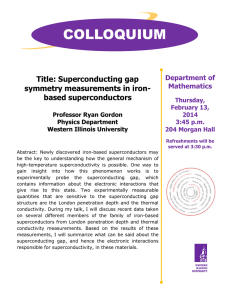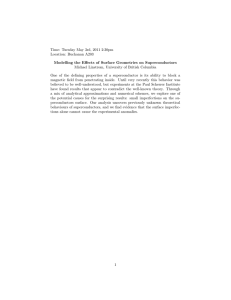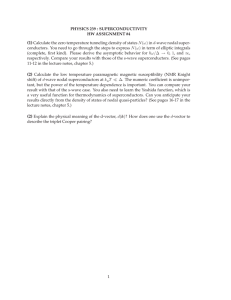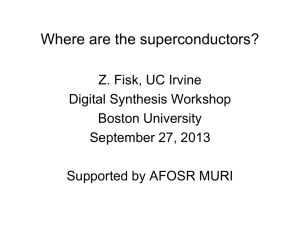Chapter 9:
advertisement
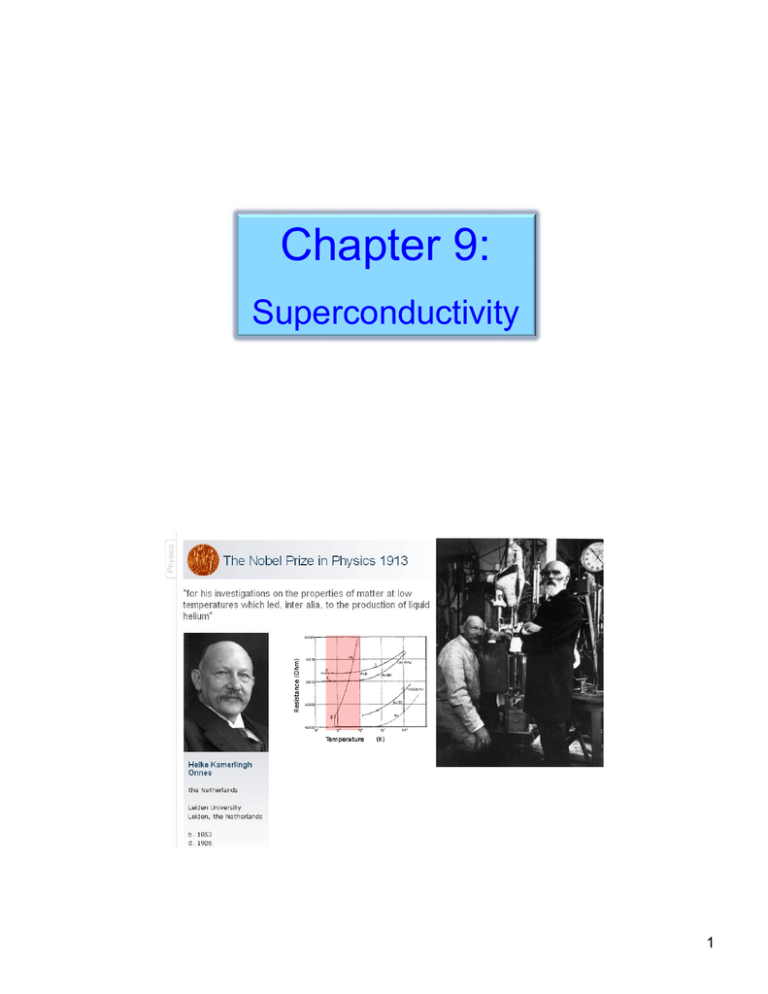
Chapter 9: Superconductivity 1 R R0 Tc Temperature Transition temperature http://www.magnet.fsu.edu/education/tutorials/magnetacademy/superconductivity101/page4.html 2 Magnetic Properties of Superconductors B = H(1+ ) B = magnetic flux H = applied field = magnetic susceptibility Below the critical temperature, Tc, it expels all magnetic flux from the interior www.magnet.fsu.edu 3 • The critical temperature (Tc) drops with an increase in magnetic field • The minimum value of the field strength required to bring about this change is the critical field strength, Hc. Type I Superconductors Superconductivity exists only below a critical temperature and below a critical magnetic field strength. • “Soft superconductors” Rh Be W Ir Lu Hf Ru Os Mo Zr Cd U Ti Zn Ga Tc (K) 0.00033 0.023 0.015 0.1 0.1 0.1 0.5 0.7 0.92 0.546 0.56 0.2 0.39 0.85 1.083 Gd* Al Pa Th Re Tl In Sn Hg Ta V La Pb Tc (K) 1.1 1.2 1.4 1.4 1.4 2.39 3.408 3.722 4.153 4.47 5.38 6.00 7.196 4 Type II Superconductors Type II ‘hard’ superconductors have much higher critical fields and carry much higher current densities while remaining in the superconducting state. Compound Transition Critical Field Temperature (T) (K) NbTi 10 15 PbMoS 14.4 6.0 V3Ga 14.8 2.1 NbN 15.7 1.5 V3Si 16.9 2.35 Nb3Sn 18.0 24.5 Nb3Al 18.7 32.4 Nb3(AlGe) 20.7 44 Nb3Ge 23.2 38 A Type-II superconductor is characterized by a gradual transition from the superconducting to the normal state within an increasing magnetic field, 5 BCS Theory of Superconductivity •electron–phonon interactions •energy of the pairing interaction is quite weak, of the order of 10−3 eV, and thermal energy can easily break the e- pairs up. 6 High Tc Superconductivity http://www.magnet.fsu.edu/education/tutorials/magnetacademy/superconductivity101/page6.html 7 La2-xBaxCuO4 If x > 0, average oxidation state Cu is >2+ Positive holes formed in the valence band, p-type Tc = 35 K High Tc Superconductivity Tc = 93 K Related to the Perovskite structure type. SrTiO3 YBa2Cu3O7-d 8 Ferromagnetic Superconductors Sr2RuO4 is related to the La2CuO4 structure. Metallic, Tc = 1.5 K • Conventional superconductors are diamagnetic Sr2RuO4 Triplet state, four 4d electrons in t2g band LaFeAsO (F-doped) Tc = 26 K SmFeAsO1-xFx under pressure, Tc = 55 K Layered structure 9 Application of Superconductors - NMR Superconducting elements of the wire found in NMR spectrometers are made of Nb3Sn or (NbTaTi)3Sn embedded in Cu. Other Applications of Superconductors Maglev Train NMR SQUID Magnetometer power-transmission cable http://chem4823.usask.ca/nmr/magnet.html http://www.nanomagnetics.org/instrumentation_and_characterization/squid_magnetometers.php http://www.magnet.fsu.edu/education/tutorials/magnetacademy/superconductivity101/maglev.html http://spectrum.ieee.org/energy/the-smarter-grid/superconductors-enter-commercial-utility-service 10
